The Iliad (Trans. Caroline Alexander) Read online
DEDICATION
TO ELIZABETH ANN KIRBY
My mother,
who always knew that I would do this
CONTENTS
Dedication
Introduction
A Note on the Translation
Geography of The Iliad
The Gods
The House of Atreus
The Line of Aeacus
The House of Priam
Book 1
Book 2
Book 3
Book 4
Book 5
Book 6
Book 7
Book 8
Book 9
Book 10
Book 11
Book 12
Book 13
Book 14
Book 15
Book 16
Book 17
Book 18
Book 19
Book 20
Book 21
Book 22
Book 23
Book 24
Notes
Selected Further Reading
Acknowledgments
Also by Caroline Alexander
Copyright
About the Publisher
INTRODUCTION
The Iliad begins its story in the tenth and final year of the Trojan War, which has ground to a stalemate between the two opposing armies—the invading Achaeans, as Homer calls the Greeks, and the besieged Trojans, who are fighting for their city, which lies only a few days’ sail from the Greek mainland, and which they call both “Troy” and “Ilion.” The cause of the war was the seduction and abduction of Helen, the beautiful wife of king Menelaos of Sparta, by handsome Paris (also called Alexandros), one of the many sons of Troy’s king, Priam. Mustered from all over the Greek mainland and islands under the command of Menelaos’ wealthy and powerful brother, Agamemnon, king of Mycenae, the Achaeans have grown weary of the war. Their ships, beached at the edge of the Trojan plain, are decaying with disuse. Their greatest warrior, Achilles, has just publicly denounced, in the most bluntly brutal terms, both the war and his commander, and it appears that much of the Achaean host shares Achilles’ view that the war is no longer worth fighting.
For their part, the besieged Trojans are increasingly desperate. Hemmed inside their city walls, they and their regional allies have long been preyed upon by marauding Achaeans, and their resources are dwindling. Suddenly, unexpectedly, feckless Paris turns to his brother, Hector, the heroic warrior upon whom the Trojans most depend, and makes a welcome suggestion: he will personally challenge Menelaos to a duel. The two chief protagonists of the conflict, then, will fight it out man-to-man and the rest of their armies, Achaean and Trojan, can leave in friendship and peace. Swiftly Hector announces this offer to the Achaeans and after an anxious hush—the Iliad gives a number of tactful hints that the Achaeans do not regard Menelaos as the mightiest of their warriors—Menelaos accepts, and a treaty is cut to sanctify the outcome of the duel.
So he spoke, and both Achaeans and Trojans rejoiced,
hoping to make an end of the sorrowful war.
And they reined the chariots into line, and themselves descended
and took off their armor, and placed it on the ground
close together, and there was little earth left between. . . .
And thus would a man speak, both Trojan and Achaean;
“Zeus most glorious and greatest, and all you immortal gods,
those who first do harm in violation of the sacred treaty—on whichever side they be—
may their brains flow—thus—upon the ground, like this wine,
and the brains of their children, and may their wives be forced by other men.”
So they spoke; but the son of Cronus did not accomplish this for them.1
It is a remarkable scene in a great war epic—the warriors of both armies making violent prayer to go home in peace. The scene is wholly consistent with the epic’s depiction of war as something loathed and dreaded by all who must participate. Lugrós, polúdakrus, duse¯lege¯s, ainós—wretched, accompanied by many tears, bringing much woe, dread—these are the adjectives the Iliad uses for war. Every mortal being at Troy, man and woman, warrior and civilian, wants the bloody and exhausting Trojan War to end.
The Iliad, above all else, is a powerful, first-rate story, whose dramatic action is wrapped around such time-tested themes as insulted honor, love, loss, and revenge. Its cast of characters, mortal and divine, is among the most enduring and compelling in all of literature, and it is through their words and fates that the epic asserts its tragic vision. But central to this tragic vision is the Trojan War. The war is not merely a dramatic backdrop for heroic action, nor, as I was taught at times, a poetic metaphor for the human struggle and experience. The Iliad is riveted on what may be called the enduring realities of war: the fact that an individual warrior must risk his life for a cause in which he does not believe, or must subject himself to the command of a lesser man; or that a successful warrior needs not only skill, but the good luck of being loved by the gods—and that these same gods are fickle, and the outcome of any combat mission is therefore fraught with mortal uncertainty; above all that war blights every life it touches. Warriors, Greek and Trojan, the women they capture and the women they love, those too young to fight and those too old, the victorious and the vanquished, the wounded, the dying, the dead—the fate of all are evoked by the Iliad. And all the while looming ever closer through the dust of battle is the imminent destruction of the city of Troy and all her people as casualties of the hated war. Compassionate but clear-eyed, the Iliad evokes the bedrock fact of the human experience, namely that every mortal being, even the greatest—even an Achilles—cannot escape death. And this terrifying truth is seen in high relief because this is a war story, and tragic loss and mortality are never more nakedly revealed than in time of war.
The Iliad opens upon a scene of plague raging through the Achaean camp. The Achaean hero Achilles, the greatest warrior fighting at Troy, calls an emergency assembly. Here Calchas, prophet and seer to the army, reveals that the god Apollo sent the plague as retribution for the mistreatment of one of his priests at the hands of Agamemnon, the king of wealthy Mycenae and commander-in-chief of the diverse Achaean host. The priest’s daughter had been seized along with other plunder on a recent raid, and when the aged priest came to the Achaean camp to offer ransom for her, Agamemnon harshly rebuffed him. Now, Calchas declares, the only remedy is for Agamemnon to surrender the girl to her father. This straightforward solution is angrily rejected by Agamemnon, who sees himself diminished by the loss of his prize. When Achilles steps in both to rebuke and to encourage compliance, a bitter quarrel erupts between the two men. Agamemnon threatens to take Achilles’ own prize, a young woman named Briseïs, who was also captured in a raiding party, but whom Achilles has come to love. Achilles in his turn angrily withdraws himself and his men, the Myrmidons, from the war, and also threatens to return to his home in Thessaly. Stubbornly, Agamemnon refuses to relent. He duly returns the priest’s daughter, but then dispatches heralds to conduct Briseïs from Achilles’ quarters to his own.
The subsequent action is concerned with the repercussions of Achilles’ wrath. At Achilles’ request his mother, the sea goddess Thetis, goes to Zeus, the almighty ruler of Olympus, to beg a favor for her son. Achilles is destined to be short-lived, she reminds him, and therefore he should at least win honor. Her request of Zeus is that he safeguard this honor by ensuring that Agamemnon be made to feel the loss of his greatest warrior, and so come to regret his taking of Achilles’ prize. Zeus bows his head in assent, and the tide of battle turns disastrously against the Achaeans. At length, with all his other best warriors wou
nded, Agamemnon sends a delegation to Achilles, who has been sitting idle by his ships, to beg that he return to battle in exchange for a dazzling array of gifts. But Achilles, during this unaccustomed absence from fighting, has come to see the value of his life. He has two possible fates, he tells the delegation:
For my mother tells me, the goddess Thetis of the silver feet,
that two fates carry me to death’s end;
if I remain here to fight around the city of the Trojans,
my return home is lost, but my glory will be undying;
but if I go home to the beloved land of my father,
outstanding glory will be lost to me, but my life will be long.2
His choice, he announces, is to live long and obscurely rather than die with glory, and he repeats his threat to sail back home. Achilles’ shocking renouncement of the warrior’s creed comes in Book 9 of the Iliad’s twenty-four books (as by long convention the chapters are called) and his speech here is one of the finest in the epic. The speech makes poignant all that follows; from this point on, the Iliad cannot be mistaken for glorifying war’s destructive violence. Rather, it makes explicit the tragic cost of such glory, even to the greatest warrior.
The embassy to Achilles returns defeated, and the men must continue fighting. But Patroclus, Achilles’ closest companion, stricken by the suffering of their comrades, begs Achilles to lend him his armor—seeing him armed like Achilles, the Trojans will retreat in fear, believing Achilles has returned. Reluctantly Achilles agrees, but his deepest fear is realized when Patroclus is slain by Hector with significant help from the god Apollo. At the death of his beloved companion, Achilles, filled with shame and anger as well as loss, returns to the war with the single-minded intent of avenging his friend. This he does, in a momentous showdown that ends with the death of Hector. After Achilles buries Patroclus with full honors, Hector’s father, Priam, the king of Troy, comes at night to the Achaean camp to beg for the body of his dead son. Achilles relents and returns the body, and Hector is buried by the Trojans. The epic ends with the funeral of Hector.
From ancient times, this epic has been called the Iliad (the first mention of its title is made by Herodotus in the fifth century B.C.3), meaning “the poem about Ilios,” Ilios being another name for Troy. With the death of Hector the imminent fall of Troy is made explicit.
Homer’s epic, then, relates the events of a narrow period within the legendary ten-year-long Trojan War. The complete story of the war, supported by a sprawling web of subplots and a broad cast of both momentous and minor characters, was told by a series of six other epics, known collectively as the Trojan war poems of the Epic Cycle. Of various dates beginning from approximately 625 B.C., these other epics were composed considerably later than the Iliad, but, like the Iliad, are thought to have drawn upon much older common traditions. Long lost to time, the epics are known today only by rough summaries and a few surviving lines. From these we learn that the epic Cypria told of the origins of the war, for example, while the Aethiopis told of the death and funeral of Achilles. Other epics told of the capture of Troy by the Greeks, the destruction of Troy, and the return of the Greek veterans to their homes4 (although not part of the Epic Cycle, Homer’s Odyssey, which tells the story of the long voyage home of the veteran hero Odysseus, is such an epic of return).
Because the Iliad’s action occurs over the course of a few weeks toward the end of the war, many well-known events are not included. The epic does not tell of the fatal beauty competition between the goddesses Hera, Athena, and Aphrodite, of which Paris was judge, for example, although a few lines in the last Book of the Iliad appear to refer to this event.5 Likewise, the seduction of Helen by Paris is not described, but is referred to on several occasions, most poignantly by Helen herself, as in her words to Priam, in Book 3:
And Helen shining among women answered him with these words:
“Honored are you to me, dear father-in-law, and revered,
and would that evil death had pleased me at that time when
I followed your son here, abandoning my marriage chamber and kinsmen,
my late-born child, and the lovely companions of my own age.
But that did not happen; and so I waste away weeping.”6
Given the wide array of dramatic events encompassed by the sprawling legend, the Iliad’s chosen subject is striking—the quarrel between a warrior and his commander in chief during a protracted stalemate. Behind this choice there undoubtedly lay a much older story built on the familiar themes of wrath, revenge, and the return of a slighted warrior. As it is, the Iliad’s choice necessarily rivets attention on Achilles. This epic thus does not focus directly on the launching of fleets, or the fall and plundering of cities, but on the tragedy of the best warrior of the Trojan War, who, as the Iliad makes relentlessly clear, will die in a war in which he finds no meaning.
The Iliad evokes a mythological world, one in which Olympian deities descend to the field of battle to fight alongside mortals, or whisk a favorite warrior to safety. Yet this poetic, mythological world is grounded in recognizable human experience. When the god Hephaestus forges a new shield for Achilles, he decorates it with scenes drawn from the lives of men:
And on it he made two cities of mortal men,
both beautiful; and in one there were weddings and wedding feasts,
and they were leading the brides from their chambers beneath the gleam of torches
through the city, and loud rose the bridal song;
and the young men whirled in dance, and in their midst
the flutes and lyres raised their hubbub; and the women
standing in their doorways each watched in admiration.7
Majestic similes evoking the natural world flash through the epic, similes that are effective because the scenes they describe are enduringly familiar:
As when on a mountain height the South Wind spills dark mist—
no friend to the shepherd, but to the thief better than night—
and a man sees before him only so far as he throws a stone;
so the thick dust rose beneath the feet
of the advancing men; and in all swiftness they traversed the plain.8
Or the description of Achilles’ divinely forged helmet:
As when to sailors at sea there appears the light
of a watchfire burning, which blazes high on the mountains
in a lonely fold, as storm winds carry them unwilling
across the fish-filled sea far from their friends,
so the flare from Achilles’ shield, beautiful and intricately wrought,
reached the high clear air. And lifting his heavy four-ridged helmet
he placed it about his head; and it shone far like a star.9
The mythological world of the Iliad is also grounded in a specific period of history. The epic’s references to geographical place-names, types of armament and clothing, to fortified cities and other artifacts, can be correlated with archaeological finds dating to the Greek Bronze Age. In broad and somewhat fuzzy outline, then, the world evoked by the Iliad falls within the period dating from the seventeenth to the end of the thirteenth century B.C., which historians call “Mycenaean,” after Mycenae, the principal Greek citadel-state of the time.10
The Mycenaeans came to power on the Greek mainland in the seventeenth century B.C. and by the fifteenth century had achieved ascendency throughout the Aegean. Sailors and traders, they were also warriors and raiders. Cuneiform documents in the royal archives of the contemporary Hittites (the ruling power of Anatolia, now Turkey) refer to marauding Mycenaean troublemakers, suggesting that bands of individuals, if not organized armies, roamed the Anatolian coast, looking for plunder.11 The Iliad also mentions such raiding. “Twelve cities of men I have sacked from my ships,” boasts Achilles,
“and eleven, I say, on foot throughout Troy’s rich-soiled land;
and from all these I carried off as spoil many treasures, valuable treasures.”12
The he
ight of Mycenaean power was reached in the late fourteenth and thirteenth centuries B.C., the so-called palatial period, named for the great palace complexes built at this time. Mycenae, Tiryns, Pylos, Argos, Thebes, Iolkos—the Iliad names many of the sites that archaeology has uncovered. This is the period to which most historians would ascribe any historical Trojan War.13 Like other great civilizations of the Bronze Age, the Mycenaeans kept written records, in this case tablets of baked clay inscribed with a syllabic ideogram script called Linear B. These records have yielded no diplomatic documents, treaties, or letters, as have the Hittite, Egyptian, or Assyrian royal archives; no historical accounts of skirmishes or battles; no poems, or prayers, or fragmentary epics—nothing but the careful inventories of possessions:
Kokalos repaid the following quantity of olive oil to Eumedes: 648 liters of oil.
One footstool inlaid with a man and a horse and an octopus and a griffin in ivory.
One pair of wheels, bound with bronze, unfit for service.
Twenty-one women from Cnidus with their twelve girls and ten boys, captives.
Women of Miletus.
And:
To-ro-ja — Woman of Troy.14
How a woman of Troy ended up in the inventory of a Mycenaean palace cannot be known from one slender entry. Like the women of Cnidus, she may have been a captive, taken as booty in a raid. But she may also have been acquired through trade, for the Mycenaeans had trading settlements along the Anatolian coast, and as the archaeological record indicates, Mycenaean traders had substantial contact with Troy. A small Bronze Age cemetery, apparently a burial ground for foreign mariners, unearthed west of Troy’s ancient harbor, contained a mass of Mycenaean pottery and objects. 15
Situated at the entrance to the Dardanelles, which Homer calls the Hellespont, Troy in the late Bronze Age was a prosperous settlement surmounted by a palace citadel. As the mariners’ cemetery suggests, the site was visited by diverse ships of trade, and it is possible that the city’s wealth came from its control of the Dardanelle strait and thus access to the Black Sea beyond. The city’s influence extended throughout the Troad, as the surrounding region is still known, and to islands such as Lesbos to the south.

 The Odyssey
The Odyssey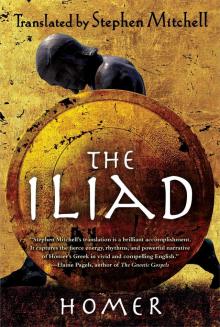 The Iliad
The Iliad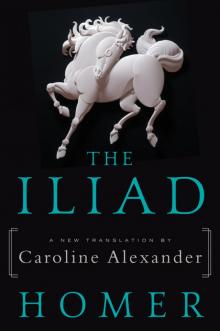 The Iliad (Trans. Caroline Alexander)
The Iliad (Trans. Caroline Alexander)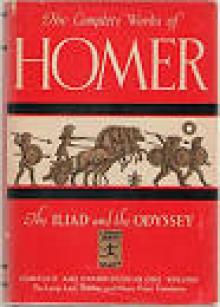 Complete Works of Homer
Complete Works of Homer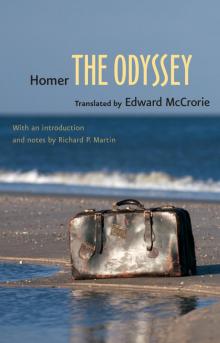 The <I>Odyssey</I>
The <I>Odyssey</I>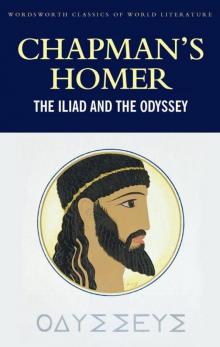 The Iliad and the Odyssey (Classics of World Literature)
The Iliad and the Odyssey (Classics of World Literature)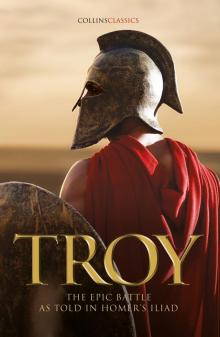 Troy
Troy The Iliad (Penguin Classics)
The Iliad (Penguin Classics)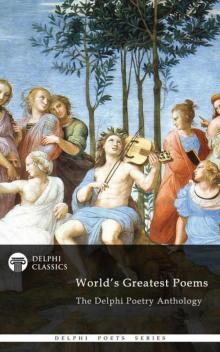 Delphi Poetry Anthology: The World's Greatest Poems (Delphi Poets Series Book 50)
Delphi Poetry Anthology: The World's Greatest Poems (Delphi Poets Series Book 50)